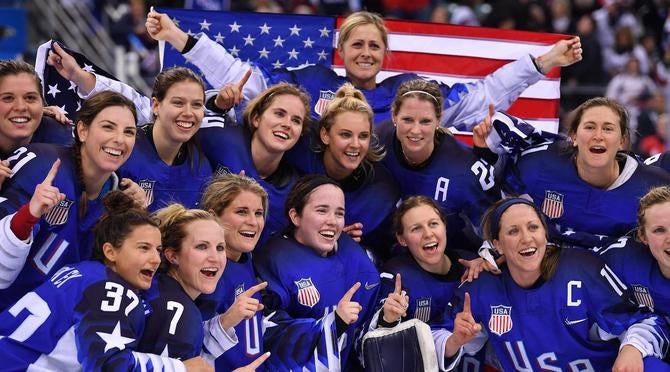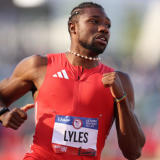The last 12 months have been a roller coaster ride for the United States women's national hockey team, but on Thursday in Pyeongchang, that ride reached its ultimate peak -- an Olympic gold medal.
Team USA defeated Canada, 3-2, in a thrilling shootout win in South Korea to earn their first gold medal in 20 years. It was the third consecutive Olympics in which the American and Canadian women faced off in the final, and this one came 38 years to the day of the "Miracle On Ice."
For the American women, there was no miracle necessary. Thursday's gold medal game was earned on the strength of skill, execution, perseverance, heart and fearlessness. It was a perfectly fitting way to wrap up what has been an incredible last year for the Team USA women, who have earned major victories both on and off the ice.

Last March, just weeks before the 2017 Women's World Championships were set to get underway in Michigan, members of the U.S. team announced that they planned on boycotting the tournament over a fight for fair wages and equitable support from USA Hockey.
The two sides had privately been in negotiations for over a year and made little progress on a new deal. With Worlds on the horizon, the women saw an opportunity to make a bold statement, and they pounced.
US WNT will not play in 2017 World Championship due to stalled negotiations over fair wages and support from USA Hockey #BeBoldForChange pic.twitter.com/qEXVyoKE6y
— Hilary Knight (@HilaryKnight) March 15, 2017
At the time of the boycott, the United States women's players were only being paid $6,000 every four years ($1,000 per month during a six-month Olympic training period). They also were receiving significantly less benefits and funding in developmental programs compared to the men's program.
"It is a full-time job and to not get paid is a financial burden and stress on the players, obviously," USA forward Jocelyne Lamoureux, who scored the game-winning shootout goal in the Olympic final, told ESPN back in March. "That is the conversation my husband and I are having right now. Is playing going to be more stress than we can handle? Sadly it becomes a decision between chasing your dream or giving in to the reality of the financial burden."
USA Hockey initially pushed back against the women's boycott, releasing a statement saying that they have long treated the women's program fairly and provided equitable support. American star forward Hilary Knight called the statement "inaccurate and dishonest, at best."
For the women, their protest wasn't just about money.
"At the [2014] Olympic jersey announcement, we had no women representation at that announcement," Knight told me in March. "The Olympic jerseys were supposed to have all the gold medal symbols inside the collar and 1998 was left off of that jersey. They continue to sell jerseys without the 1998 on the inside of the collar."
American captain Meghan Duggan on that 2014 jersey snub: "It was heartbreaking, honestly. We put our lives into this team. But to USA Hockey, we were not even thought of. We were so disappointed. It was a slap in the face and another sign of disrespect."
In the heat of the boycott, USA Hockey reportedly explored the option of icing a team with replacement players, but with the Worlds being hosted on home soil and Team USA going in as reigning champs, the women held a lot of leverage. They stood their ground and, eventually, USA Hockey relented.
Just prior to the tournament, the two sides reached a four-year deal that would provide the women with annual salaries around $70,000, with a chance to earn close to $100,000 with added medal bonuses. In addition, USA Hockey agreed to provide accommodations and insurance on par with what the men received, plus more funding and support to the women's development program.
It was a landmark victory for current and future American women's players.
To Our Dearest Fans,
— Hilary Knight (@HilaryKnight) March 29, 2017
Together, WE dared to make history. And couldn't have done it without you. See you at #2017WWC#BeBoldForChange #OwnIt pic.twitter.com/WGBZByCcYI
A few weeks later, the United States rewarded the renewed commitment from USA Hockey, defeating Canada in the gold medal game at the World Championships. Knight scored the game-winner for USA in overtime.
That gold medal from Worlds will now be paired with a gold medal from Pyeongchang, where the United States women took home their first gold Olympic gold medal since 1998 in Nagano -- the first women's tournament in Winter Games history.
Watching the women celebrate in South Korea, it was hard not to get the feeling that the win was the perfect storybook ending to what has been an amazing and, quite frankly, a badass year for the USA women.
This group was able to put their frustrating past to the side and create a new future through fierce willpower and an ability to capitalize on what was in front of them. They had an unwavering resolve, even in the face of pressure and resistance from their opponent, and they didn't blink.
As a result, they found a way to become champions in the sport, both in and out of uniform.
















